
The American channel, NBC, is broadcasting the Olympics.
NBC will "give" you 5 free minutes online. Then you must log in with your satellite or cable TV subscription info. Once you do that, if you have a subscription, you will then be told "this content is not available in your location".
Basically, if you are out of the USA, and want to watch the Olympics on NBC you cannot.
That is unless you, both:
You can skip all that by using USTVnow.com!
USTVnow was created for US Military and US Citizens living abroad. It is free.
A short aside:
You can also watch the Olympics with BBC online. This is new. Or at least new since the last time I tried. At one time I tried channels from a variety of countries to watch the Olympics. I was never successful (without a VPN). Also, it is interesting to watch the Olympics from BBC's perspective.
I will write about VPNs another time. But for now, "A VPN, or Virtual Private Network, allows you to create a secure connection to another network over the Internet. VPNs can be used to access region-restricted websites, shield your browsing activity from prying eyes on public Wi-Fi, and more." (by how-to geek)
I like the VPN, unblock-us. It is the best of all the VPNs I have tried. It is the only one that consistently and successfully fools TV and video sites that won't let me watch their content if I am out of the USA.
Back to USTVnow. Again, it was created for US Military and US Citizens living abroad. It is free.
Well you can pay money for more channels and to record shows, but the basics are free.
We don't own a TV so we watch everything online. Which is not much of an issue, except when you want to see something live. Like the Olympics or the World Cup.
I really wish we had known about USTVnow when we first came down to Panama. The Olympics were on then. I so wanted to watch, but could not. That was before I knew about USTVnow, or VPNs like Unblock-us, and more.
The Free Plan
With USTVnow's free plan, you get all the major stations that you would normally get free in the USA
For 45 days, you will see these channels in hi resolution on you computer or other devices (iPad, iPhone, Android and Roku). After 45 days, you will only be able to watch on your computer and it will be in low resolution.
The Paid Plan
If you pay, you get more channels, the ability to watch on other devices (ipad, etc), and the option to record shows. Supposedly, you also get high-resolution. But I have been on the paid plan from time to time and have not noticed a difference in resolution.
I have paid for USTVnow at times, for various reasons.
It was worth it to watch the World Cup. It was necessary when my mom visited. But the buffering issues during the debates were so annoying that I ended up simply watching the replays on Youtube the next day.
Cost
If you want all the channels USTVnow offers, it costs $19/mo for 1st 3 months. Then $29/mo.
If you want all the channels plus the ability to record, it costs $29/mo for 1st 3 months. Then $39/mo.
To see all the channels that they offer, visit USTVnow.
The easiest way to see the Olympics live and online, is to use USTVnow or BBC. USTVnow is a good option for anytime you want a USA TV fix, commercials included.
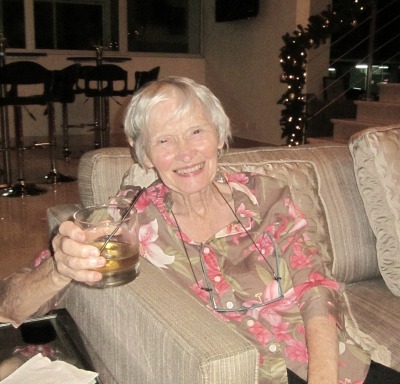
He left Puerto Armuelles to spend what he thinks are his final years living with a close friend in Costa Rica. This woman is half his age, very kind, and she has the resources to provide for all of his needs.
This situation, and the fact that Betsy and I have 2 elderly parents currently in assisted living in the U.S., has prompted me to do a bit of thinking and researching on the subject of aging.
This article is aimed at readers who are thinking about retiring in Panama.
I hope you find it useful. Please send in comments, since we hope to continue writing about this very important topic.
On those very rare times when Betsy and I actually talk about "when we get truly old" or aging (other than to complain about aching shoulders, hips, fingers, you name it), it seems that Betsy is inclined to want to be in Seattle, or living with or near one of our daughters, wherever that may be, when she gets to be truly old.
I, on the other hand, though I will miss my friends and family from the north, imagine that a life in a warmer climate, would be optimal, at least most of the year. Fortunately, in our case, I am probably willing to acquiesce to Betsy’s preferences. Her wisdom in such matters is generally correct. Our family always benefits when we follow Betsy’s intuitions. (Of course, she could also change her mind.)
Having admitted all this, I still think that there is a good place in our retirement plans for Panama, particularly in our early retirement.
But why would a person choose to arrive at his/her final years, and final days in a foreign country, far from family? What are the potential advantages/disadvantages? Is this a valid option for retirees to consider?
There is lots of hype on the internet about the advantages of retiring overseas, in the tropics, even in Panama itself. But what would it be like for you? (What would it be like for me? I’m 56. Betsy is 54.)
Warmer
First of all, we both agree that we feel younger in the warmth of Panama than we do in the cold and damp of Seattle (That is, except during the peak of the dry season in Panama, which is too hot for us. And during summer in Seattle, which is the most ideal weather on Earth, we think.)
Affordable Home Health Aides
If it were merely about the money, then yes, Panama is much cheaper than the U.S. (I do not know enough to make a verdict about Canada).
I just wrote another article about healthcare in Panama. In it, I mentioned that one of the biggest differences in the cost for healthcare in the U.S. vs. Panama is the vast difference in labor costs for basic, unskilled, or semi-skilled nursing care.
A large factor in health care costs for the elderly is the need for more and more hours of home health care and nursing care. The elderly expat living in Panama will have huge saving potential on such aid,
In Puerto Armuelles, it is possible to find a live-in domestic helper for as little as $400/month. In David, this cost would be somewhat higher. In Panama City, you might pay as much as $2000/month for a fully licensed professional nurse through an agency.
With careful research, checking references, you can find an excellent helper. Some expats have reported that their own domestic aid has become more like a part of their family than a hired helper. Some expats even include this person in their will as a beneficiary.
Conversely, with poor planning, or just bad luck, you might end up hiring someone who is a terrible worker, or even steals from you. (Unfortunately, this last detail can occur anywhere. I remember my well-to-do grandmother, who was blind and lived to be 97, was routinely robbed at her expensive retirement home in Washington D.C. So, you can have a bad experience of this sort anywhere).
Betsy’s mom is in a great retirement home in Seattle, about 2 miles from our Seattle home. My father is in a retirement home in Washington D.C., close to my sister’s home. Both of our parents rely upon and cherish visits from their adult children and their grandchildren.
Panama not good choice for Betsy's Mom
In the case of Betsy’s mom, she would not fare well in Panama. She has a lot of trouble “focusing” and, though she is a wonderful woman, she has trouble making real friends, because she has trouble following conversations with other adults. It is only with loving one-on-one chats with her children (including me) that she feels that emotional bond that she so craves.
Panama would have been a good choice for My Dad
In the case of my father, he has spent much of his adult life living abroad. And much of that time in the tropics (my sisters were born in Cuba). He would be very comfortable with the idea of retirement in Panama. He even speaks pretty good Spanish.
Other than my older sister, he does not see many family members on a regular basis. However, he is quite content to go to the dining hall or social hall, and strike up a conversation with just about anyone.
In truth, he says that he would have loved to retire in the tropics. In his wistful moments, he sometimes asks himself why he didn’t stay in the tropics to retire. However, at 90 years of age, it seems too late for him to make the move down to Panama. He is in a safe, happy environment and most days he seems to do pretty well. It is only on his bad days that he wishes he were somewhere else --- A lot like everyone.
Since I am now “pushing” 60 myself, I think I can relate with many of the expats who are considering a move down to Panama for their retirement.
Retirement Business
A lot of the folks who are closer to my age, on the younger side of retirement, would like to semi-retire early, and continue to do some sort of work in Panama.
That is what we have done, by investing and land developing in Puerto Armuelles. We effectively bought a small retirement business. This works well for both of us, since we have never viewed retirement as those years after 65 when one has earned the right to do absolutely nothing. We plan to stay active always, or at least as long as we possibly can.
Is Your Plan To "Go Back Home"?
Some retirees who choose to move to Panama at 55, 60, 65, or 70 may have in mind to return "back home" to be close to family and loved ones, when they finally arrive at their advanced old age. This desire is quite common. There seems to be something in each one of us that longs for the familiar, as our world grows smaller and smaller, and we prepare for our own death.
Plan Ahead to Age in Panama
There is a growing number of single retirees in the U.S., who either never married, or are divorced, or whose spouse has died. Some of these retirees may not have anyone in the U.S. to return to in their last years.
For such folks, it is probably advisable to come to Panama early enough in their retirement, so that they can become familiar with their new home, make friends, and prepare a late retirement environment that suits them. They will probably want to have a close friend or family member, at the very least, to supervise their caregivers and pay their bills, when they are no longer able to so. Even in the States, an elderly person needs someone to be their advocate, to make sure that they are well cared for, and listened to (this is a big one).
Letting Go
No matter what form your late old age takes, or where that event takes place, there is a tremendous amount of “letting go” that one must do in order to make the transition from healthy retirement, to a state of being very old, chronically weak, or sick, and eventually dying.
I know that my own father is still resentful that the keys to his car were finally taken away a couple of years ago. Betsy’s mom has had similar problems letting go of her independence, especially letting go of her car.
There are those who think that having the North American elderly loose on the roadways of Panama would not hurt the general quality of driving here in Panama…that is a subjective opinion.
I am not trying to come to any conclusions here. The idea is to inspire thinking and a dialogue about what each of us envisions as our own best scenario for our final years.
Clearly, one can live more comfortably in Panama, on less money. This, in itself, might be the answer, if you are not able to afford to retire, or be old or sick, in the U.S. (or wherever your "home" is.) However, for those who have options, the conclusion might be different.
Maybe Panama is the right choice for one’s early retirement years, as a new adventure, or chapter of your life. Maybe Panama allows you to enjoy your retirement, as well as allow you to bank all the saving that Panama offers. Because when, and if, you move back to the U.S. (or other place) to be closer to family, your living and health costs will be much high.
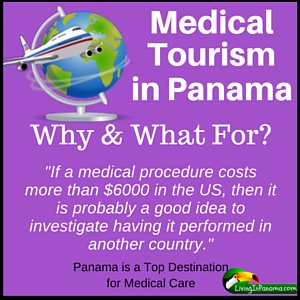
Health care information on our site:
2 hospital visits in Puerto Armuelles
4 tips for a healthy lifestyle in Panama
Overview of Health Care & Insurance Options in Panama
This friend, let's call him Bill, needs treatment for a life threatening condition. He has heavy metal poisoning due to exposure over the course of his career.
Tragically, the procedure that he requires is not yet approved in the US. The closest procedure available in the US would cost him between $20,000 to $30,000.
And his insurance doesn't cover it.
So Bill wants to get treatment outside of the USA.
Currently, Bill is trying to decide between Puerto Vallarta, Mexico, and Panama for a, hopefully, life saving procedure. As you can imagine, Bill is extremely interested in comparing service, cost, and care in Panama with that in Mexico.
Bill's plight prompted me to do some more research into health care in Panama. I am sharing my findings with you.
Not surprisingly, like many other places, the healthcare business is growing rapidly in Panama.
As we all read every day, and experience personally, we U.S. baby boomers are finally arriving at retirement age. As you would expect, the growth of the health care business is keeping pace and focusing more on health problems that happen as we age.
Lower Cost of Health Care in Panama
For most healthcare procedures, Panama is far less expensive than Mexico, or even neighboring Costa Rica.
In part, this is due to a lower wage scale for nurse care and lower cost for hospital stays.
If Bill were to get the same procedure done in Mexico (the one that costs $20-$30K in the US), it would likely to cost between $4,000 to $6000. At first glance, it appears that the same procedure, performed in Panama would be less than half of the cost in Mexico.
One healthcare publication states that,
‘If a medical procedure costs more than $6000 in the US, then it is probably a good idea to investigate having it performed in another country.’
Panama ranks high on the list of destinations for medical toursim.
In Panama, the health care services that consistently rate highest on the list for quality, and cost savings, among expats surveyed were:
Not surprisingly, these are all services that are not usually covered by health insurance in the US. Obviously, for the uninsured, the list of procedures that are advantageous to have done in Panama is much longer.
However, increasing number people traveling to Panama for major surgeries, orthopedic surgeries, joint replacements, and even transplants are helping to put Panama near the top of the list for overseas medical destinations.
(The common term these days for traveling to have health procedures done is “Medical Tourism”).
Superior Doctor/Patient Relationship in Panama
Aside from cost savings in Panama, many patients cited dramatically superior doctor/patient relations in Panama as why they choose to get health care here.
Frequently in the US patients are attended primarily by nurses or doctors’ assistants, who handle all of the paperwork, blood work, routine measurements, injections, etc. The doctor himself/herself comes in for a brief examination that is sometimes as short as 60 seconds and rarely as long as 10 minutes.
In Panama, one frequently hears fellow ex-pats exclaim that their Panamanian doctor is the best they have ever had. They marvel that he or she spends between 30 minutes to 1 hour, one-on- one, getting to know them, and becoming familiar with their specific symptoms.
Amazingly, Doctors in Panama generally give their personal cell phone number to patients. They even take calls from patients at home, including weekends and evenings. In this area of personalized patient care, Panama has the US beat hands down.
On the negative side, areas of patient care in Panama that are most frequently criticized are:
However, most western expats/foreigners can afford care at a private hospital emergency room, where service is much faster.
Seattle vs Panama as Health Care Destination
As a gross comparison, Seattle, where we live part of the year, is another very popular location for both international and domestic medical tourism.
Like Boston, and some other big cities, Seattle has become a powerhouse in the world of bio-tech and cancer research as well as clinical treatment. As such, it is not uncommon to run into people, who are in Seattle to be treated at prestigious cancer care centers as: Seattle Cancer Care Alliance, Fred Hutchinson Cancer Clinic, The University of Washington Hospital, or others.
Simply the cost of renting in Seattle, a super- expensive rental market, in addition to the housing costs back home, is a significant cost. Add to that the high medical costs of undergoing a bone marrow/ stem cell transplant, radiation, or chemo therapy, and then recovery and the bill could easily run into the 100s of thousands of dollars.
Obviously, such medical tourism is something that only the very privileged or those with amazing insurance can afford.
If you are faced with the reality of one’s own very serious and costly health condition, Panama looks like a viable alternative to care in the US.
We advise that you take your time, do thorough research of costs, services provided, and most importantly, do a “gut check” of your own comfort zone, to see if Panama might be a good fit for your health care needs.
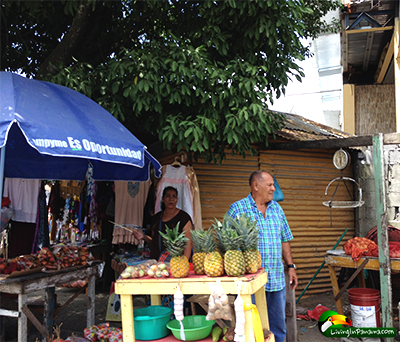
I am writing this in late March, the peak of the dry season, and the temperature can get pretty hot in these months (today there is a wonderful breeze blowing off the ocean, so it is not too hot). Since our house is not air conditioned, I sometimes find myself driving my wife’s air conditioned car to Romero’s supermarket (also air conditioned), possibly buying a local paper, and reading it at a leisurely pace, while I sip a Cappuccino (50 cents) in air conditioned bliss. When I am finished reading and sipping, I slowly wander through the aisles to choose my groceries in this comfortable, modern supermarket, before heading home to the family.
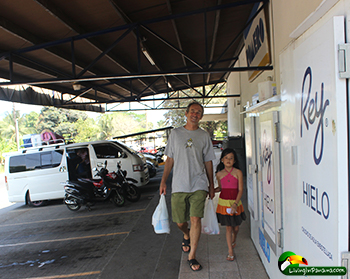
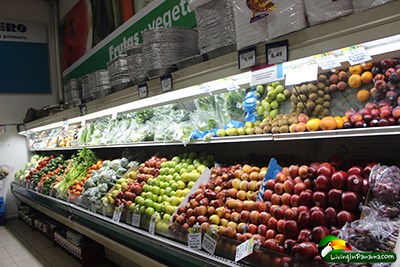
I know that I am paying more for groceries, particularly fresh produce at Romero’s than I would from one of the street vendors. Plus, the quality is not as good as it would be from the small street stalls, or pickup truck vendors who buy their produce directly from the farmers. They don’t take the produce to a central distribution center, as Romero’s does, before bringing it to Puerto Armuelles.
I have come to realize that, during the cooler, “rainy season” I go to Romero’s far less frequently. (FYI the rainy season is from mid-April to mid-December.) Most days in the rainy season, I ride my bike to run errands around town. Then, I avoid the modern supermarket. My family tends to eat more healthfully, and our grocery bills are much lower.
But this article is not about our Rainy Season-Dry Season climate here in Panama. It is about how you can save about 50% on your grocery bill, as well as eating a much healthier diet, if you buy your produce from the street vendor rather than going to Romeros or another
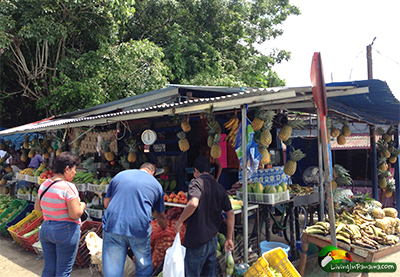
Supermaercado.
(If you do want to know about the weather in Panama, Betsy wrote about it here.)
The best days to shop are on dias los jubilados, which is when retired folks all over Panama line up to receive their semi-monthly social security check. On those days the number of vendors and the variety of items for sale skyrocket.
Find out about Chiriqui's Organic Farm, Finca Santa Marta. They deliver organic produce to you here in Puerto Armuelles and throughout Panama. The info is under Tip #2, Eat Healthfully & Locally.
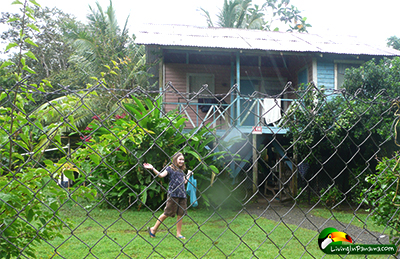
In addition to great value on super fresh produce, you can also save a bundle by purchasing fresh-caught fish from local fish buyers in Puerto.
There are several neighborhoods where a local wholesale fish buyer buys from the fishermen and will sell to you at very reasonable prices.
For example, you can always find fresh:
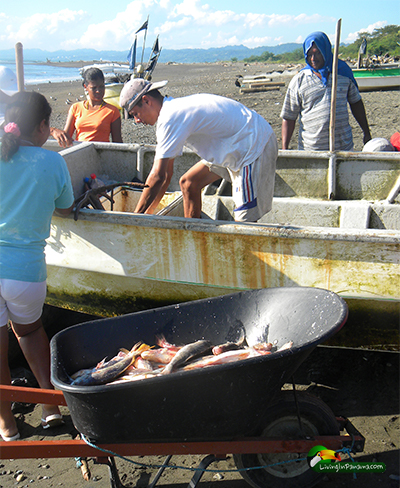
I suppose that you could try to buy directly from the fishing boat, but I have a feeling that this would not go over well with the fish buyer. Generally, all fish in the neighborhood fishing fleet are sold to one or two buyers. They get a consistent product, and they provide a consistent market for the fishermen.
Of course you also run into people trying to sell you seafood out of a bag - with no ice - I always say no to that.
Watch a video of buying fish fresh off the boat in Puerto Armuelles.
You can also buy both beef and pork from local ranchers, and save a bundle. You might have to buy an entire side, or quarter of a steer, or pig, but if you ask around, you can usually find some one to go in on the purchase. But to do that successfully, you will need to purchase a dedicated freezer to store your meat.
One neighbor of ours frequently raises a pig for his family’s own personal use. He has also built a smoker, so that he can custom smoke his own bacon, and he stuffs his own, custom smoked and seasoned pork sausage. Neighbors and friends who get on his “list” early can enjoy the same great quality pork products.
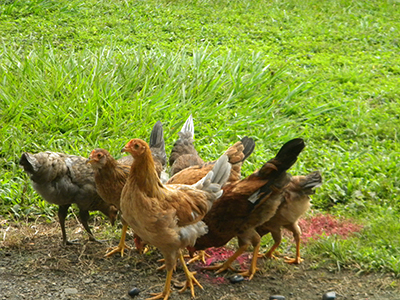
I was surprised to find that free range chickens (gallina de patio) tend to cost much more than commercially raised chickens. While a whole chicken at Romero’s, if you can find one, might cost $6 or $7, a family raised, free range bird might run as much as $13, o$14. Once I discovered just what effort it takes to raise a chicken, successfully, to adulthood, in and around one’s own yard, I understood.
As a side note, this short video below shows the challenges we had raising gallinas de patio. Of course, our daughter would never even think of us eating her chicken friends.
[leadplayer_vid id="5724C858929BD"]
The free range birds, are truly free range, and these will be the same birds that you have seen running around near the street (or in the street--- so drive carefully; “You killed it, you bought it”, as the saying goes.) When people have gallina de Patio to sell they will sometime announce that fact by posting a sign saying simply, Gallina de Patio. Ask around and you can find out who usually sells them.
Important Cooking Tip For Gallina de Patio
If you decide to buy one, you cannot cook it like you would a "regular"chicken. These birds are tough. Gallinas de Patio eats mostly bugs, and table scraps, and do not usually eat any commercial (read, hormone-fortified) feed. Thus they eat a lot more protein, very little grain, and no chemicals. They grow more slowly and get a lot more exercise than their caged counterparts. In short, these birds live a life that is a lot closer to that which a wild fowl might live. As a result, these chickens are leaner (stringier and tougher) and have a stronger, “gamier” flavor.
The first time our family tried one of these birds, we put it on the grill and basted it in barbeque sauce. We just assumed that a really “special” chicken should be cooked on the grill and enjoyed all by itself, so that the flavor could be experienced.
We were wrong.
It was like chewing on a moccasin. The free range gallina de patio is better slow cooked, in a stew pot, so that the meat has time to become tender, and so that all the rich flavor of the meat can infuse the entire stew. If you try this, you will quickly discover the superior flavor of the gallina de patio. It is a delicacy. This is what chicken used to taste like, before all the gallinas de patio were rounded up and packed 7 per cage in the mega “chicken farm”.
How to cook a Gallinas de Patio - for Sancocho, of course.
When you move to Panama, you find that you have a lot more free time on your hands. One satisfying way to spend part of your day is to shop for, and prepare the best quality food available. You will find that you can lose weight, improve your overall health, and save a bundle on your grocery bill at the same time by taking advantage of buying directly from small local producers and vendors.
Learn 4 essential tips for healthy living in Panama.
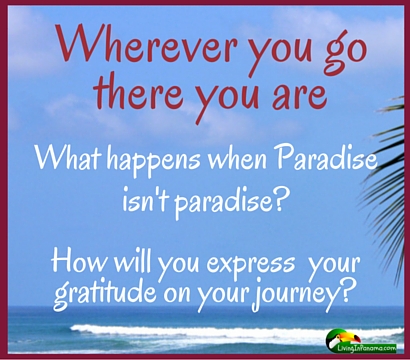
I hope that we have been clear, and honest with our readership in saying that the old saying, “wherever you go, there you are”, applies here too.
Puerto Armuelles, Panama is no different from anywhere else on the planet. What you bring to each day, is what you can expect to receive from each day.
One thing I am happy to notice in some of our recent arrivals to town is a serious, disciplined approach to their spiritual life. I do not refer to those who believe that the world is going to Hell, and that they need to find a place to hide out, and hoard scarce resources, so that they don’t have to share any.
I have spoken to a number of folks lately who talk about getting together for meditation practice, yoga, and non-denominational spiritual talks. There is even more talk about “giving back” or “paying it forward”, in the sense of a grateful recognition of all the gifts that we are being given each day, and a sincere desire to want to share our good fortune with others. I'm not saying that the old-time Puerto expat don't have those same goals, just that I am encountering a greater number of new people who are actively expressing those goals.
I think that living in another culture, as our family has in Panama for almost ten years, causes one to appreciate our good fortune to be able to experience this very simple lifestyle, and a low stress pace of life, which has allowed us to live several years within each calendar year. Time still passes for us. But, it doesn’t feel as if we are running frantically just to keep pace with our society. It is much, much slower here.
However, if you pay attention to poltics here it can be demoralizing. For instance, from reading the papers and speaking to locals, one realizes that the arrival of the Del Monte fruit company to take over banana production for our region may not take place all because of political influences that have nothing to do with the production of bananas, nor with the employment of hundreds, or thousands, of workers. The apparent reason for the possible non-signing of the contract with Del Monte, according to local experts, is that the favors being offered by Del Monte to the signatories here in Panama are not sufficient. (Although, now we hear it may actually get signed and approved. We will know when we learn that Del Monte is actually hiring people to work the banana plantations.)
I will say no more about the Del Monte negotiations. But the situation reminds me that I am very fortunate that my own livelihood is not dependent upon the good will of Panamanian politicians.
As an expat, whether you consider yourself wealthy or poor, you are automatically perceived by the vast majority of locals locals as visiting “rich and powerful elites”. It can be a bit unsettling when you realize this. But in reality even if we consider ourselves barely making it, we are most likely much better off that a big segment of the local population. So at least comparatively, you are well-off financially.
My questions today, of myself, and of all of us, are these:
What do we intend to do with all of our good fortune, or resources, our talents, and our connections? With all this time at our disposal in Panama, do we have a personal plan of action that includes working on the spiritual side of ourselves, and not just on the material? Do we have a plan of action that includes concrete steps to make life better for others less fortunate than ourselves? Or are we content to just make sure that we ourselves are safe and comfortable? I know it is a struggle to turn our focus away from ourselves and our family, but is it a valuable goal?
What are your thoughts?
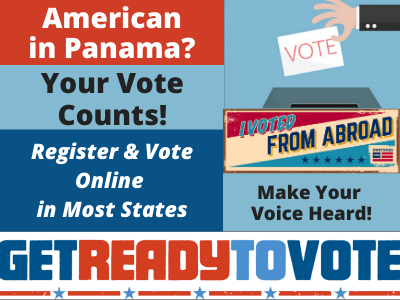
Updated 3/3/20
(Need to get a US election absentee ballot fast? Check out this October 28, 2020 post)
Your vote could be the difference.
All U.S. citizens can receive their ballots electronically.
Depending on the state in which you are eligible to vote, you can get your ballot by email, fax, or online.
[leadplayer_vid id="56D6122A14566"]
This video ends with a pro-democratic party message. I am not suggesting that you vote Democratic. I used this video for its great message, "You can vote from abroad!"
My husband and I have voted in various U.S. Presidential and other elections from Panama.
It wasn't always easy to vote from overseas. Thankfully, it continues to get easier and the number of information sites on how to vote overseas keeps growing.
I have compiled 7 reliable websites on how to register to vote, and how to vote from overseas. Many of these sites also provide information about upcoming elections. Use whichever source you like best.
1) Overseas Vote Foundation is a non-partisan site for US citizens abroad and US military. You can register to vote and request your absentee ballot through this site.
It also offers a wealth of information on the State voting requirements, election dates and deadlines, and contact information. It even includes information on candidates running for election. One thing I like about this site is that it easily lets you vote overseas, even if you are only overseas for a few weeks. This means if you are only out of the country for election day, you will remain registered in your home state, so you don't have to re-register.
Best of all, it offers a Federal write-in absentee ballot. You can use that type of ballot if your requested absentee ballot is late.
2) Democrats Abroad is the official Democratic Party arm for Americans living outside the US.
Democrats Abroad is recognized as a "state" Party by the Democratic National Committee (DNC). It is represented on the DNC by 8 voting members, as well as at the quadrennial Democratic National Convention.
It is a vibrant organization with a presence all over the world, including Panama. During the last Presidential election, they had the first ever online presidential debate between Clinton and Sanders. It focused on issues of interest to US citizens abroad.
From March 3-10, 2020, Democrats can remotely vote in the Democratic Abroad 2020 Global Primary. There are also in-person voting locations on select dates within that time frame.
Find out how to vote in the 2020 Democratic Global Presidential Primary, here.
In 2016, almost 35,000 people in over 170 countries voted in the first Global Presidential Primary. The results of that primary awarded Sanders 9 pledged delegates and Clinton 4 delegates.
3) Republicans Overseas. Good news for Republicans. Until recently there was no website for Republicans overseas. But now there is one: RepublicansOverseas.com. The main goal of the organization is to repeal FATCA. I must say I am 100% behind that effort! Their website also provides some information about voting as a Republican from abroad.
There is also a Republican Overseas facebook page, which has been around for quite a few years.
(Note: Republicans do not allow US citizens to vote in the Republican Presidential primary election while overseas. That is, unless you register in time and subsequently vote via your home state's absentee ballot system. Otherwise, Republican expats can only cast their vote for President in the general election.)
4) Vote from Abroad is a site for US Citizens that allows you to both register and vote from abroad. It also has all sorts of information, such as
5) Federal Voting Assistance Program provides voting assistance to Service members, their families, and US Citizens overseas. It seems to have an easy 5 step process as well as quite a lot of information about upcoming elections.
6) US State Department has a wealth of voting information about voting abroad. It includes a link to an emergency last minute ballot.
7) US Embassy in Panama usually has a message to US citizens about voting abroad and in Panama specifically. For example it explains where and when to submit your US ballots to locations in Panama, or if you can mail them to your home state. To find out the US Embassy's latest advice on voting, click here.
If you have questions about voting in US elections from Panama, the US Embassy Panama Voting Assistance has more information at this link. You can also email them at [email protected].
Remember, your vote counts!"
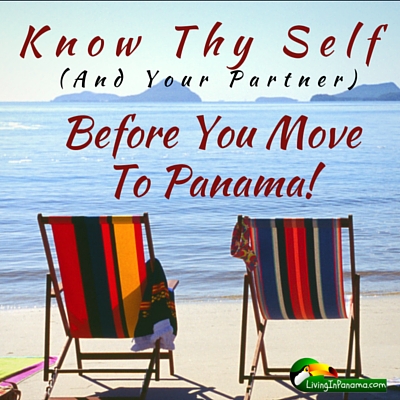
They said that the house that they have been renting in Boquete is being sold. They are now looking around & weighing their options, before buying some place. They seemed to really like Puerto Armuelles.
As we were showing them our available properties around Puerto, we also pointed out a couple of houses that are for sale by expats in town.
Expats who are moving back to the states, after as many as ten years of living in Puerto Armuelles.
We were happy to put these potential house buyers in touch with the sellers. With luck, these buyers and sellers can come to an agreement. (Please note, we are not real estate agents. But we are always happy to hook people up with others who might have what they are looking for.)
The interesting point about both of the sellers of these houses in Puerto Armuelles, was that they are both retired couples who have been in Panama longer than they would have liked. In each case, the husband was the one who really liked life down in Panama, for its simplicity, and for the low cost of living.
Both wives have told us that they would much rather have stayed in their home states, to be closer to family and friends. The move to Panama, from the outset, was not the best decision for the women. It was more to please her husband. The decision seemed more based on the low cost of living than a desire to live in Panama and to explore what Panama has to offer.
In each of these cases, thanks to a recently more vibrant real estate market, the people in question have either sold their properties or are generating interest from potential buyers. So they will soon be able to move on with their lives. However, things could have turned out far worse.
This story is a perfect example of why we strongly recommend that those who are considering a move to Panama take our quiz and do their own research on Panama.
Above all, do not purchase land, before you get to know the country. In particular, get to know the area of Panama in which you want to live. Go there and then wait at least six months before buying. Although, we didn’t didn't do that.
Do not get caught up in feelings of scarcity, or competition. If someone else buys your dream property, then it was just not meant to be. No matter what your “instincts” tell you. Moving and investing in Panama is a decision that you should make with your pre-frontal cortex. Analyze everything. Don't listen to the pretty beach property saying, “Buy Me Now!” Just take a deep breath, and let it be for awhile.
It is very important for couples to communicate honestly and clearly about their personal wishes for their retirement “adventure” in the tropics. For example, if the husband is focused on investing the family's entire life’s savings in tropical real estate, but all the wife really wants is to spend a few peaceful years in the tropics swimming in the ocean and doing some serious reading, then this is a recipe for conflict, emotional stress, and possibly divorce.
Of course, who can say that these couples might not have found some other trap to fall into, if they had retired in the States rather than in Panama? These restless husbands might have invested all their money in a trailer park in the States, and the couples might have discovered that they hate running a trailer park. Or he could have bought the Brooklyn bridge... But like moving to Panama, these life decisions should first be investigated fully - and together.
The lesson that I am hoping to share is that, while our family has benefitted greatly from the many new experiences that resulted from our decision to move to Panama, this might not be the right decision for your family.
Consider carefully. Do your research. Talk to people.
Visit Panama at least once, for at least a month, or two, or six. You may love it, as we do. However, maybe in your case, the answer might simply be “No” it’s not for you, or not for your partner (this should mean “no” for both of you, unless you were planning on divorcing anyway). It is better to be happily married in Alberta, than unhappily married in a tropical paradise.
Or, maybe you are better off planning your finances carefully, so that you can afford to live part time in your home in the north, and part-time in Panama. Or, it could turn out that Panama is absolutely a perfect fit for you, and your partner, full time - for your retirement, for your business, for your investments.
In conclusion, I would say, give Panama a try. See if it is a good fit for you and your partner. But, be patient, don’t try to force Panama to fit your retirement dream. Especially, if it is evident that it is not going to be a comfortable fit.
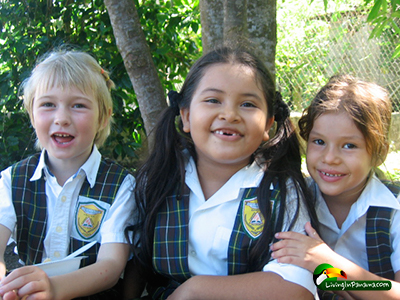
Although, the longest that I ever attended one of these schools was four months. This is because the style of teaching is so different from what it is in the US.
In the schools here, the teacher has the only text book in the class. So a lot of the time spent in class is occupied with either copying your down your lessons off the white board, or
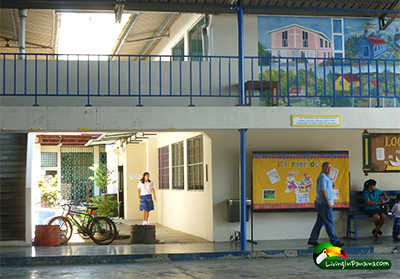
copying down your homework. For some reason the school system seems allergic to printing out worksheets.
I've heard from several of my friends that still attend school here, that they only go to school to see their friends. The quality of learning leaves much to be desired, and the curriculum is mediocre at best.
The students learn math and history and the other essentials, but the there seems to be no emphasis on reading or continuing your education beyond high school.
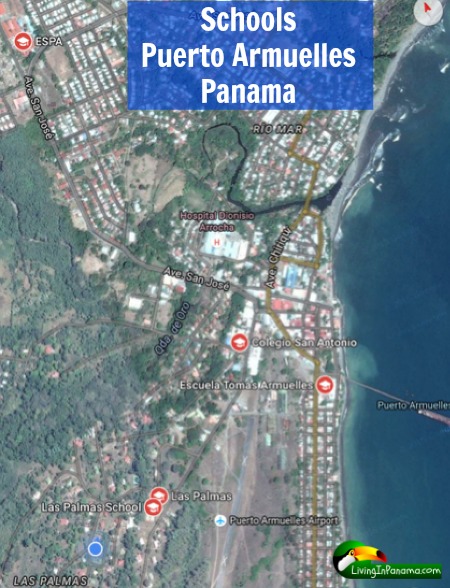
There are good things too, for example in some schools you can play a variety of sports and can learn many of the traditional dances. All the schools have a marching band, and they all participate in a yearly city parades.
If you're looking into schools here there are a few things you might want to know.
First, of all the schools here Escuela Secondario de Puerto Armuelles (ESPA) is the largest and most highly recommended in town. From what I've heard it also has the highest standard for learning. It is also the only one with a band with instruments, other than the drum and xylophone.
You may also want to read a post I (Betsy) wrote about schools in Panama. It includes a short video of my daughter Skylar in her 1st grade class here in Panama.
Among the other schools here, the one I attended most recently was San Antonio. San Antonio is known as one of the higher profile schools in town. This school is a three in one: elementary, middle, and high school, all in one large building. It has kept up a reputation as a fairly good school for the last 50 years. However it's elementary school is known to be poorer quality then some of the others in town. The middle school is supposed to be one of the best. San Antonio was the school that made me
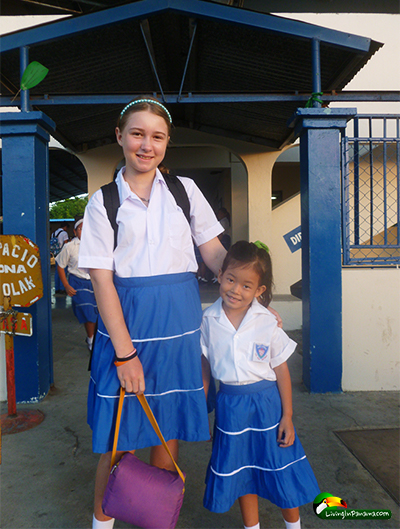
decide that the Panamanian school system was not for me.
The last school on this short list is the Las Palmas school, which is located, of course, in the Las Palmas neighborhood. This is the school I have attended most frequently, three times to be exact.
My take-away from the Las Palmas School is that it is highly over-estimated. A couple of decades ago, at the end of the Chiquita years, the Las Palmas school was the best in town. And now over twenty years later people still believe it to be one of the best schools.
However the truth is that with the contribution of bad principals and teachers, the school has deteriorated. This school is supposedly bilingual, but from my experience the school's English teachers speak worse English then an American five year old. That may be a bit harsh, but it's the truth.
The students I've met that have attended the Las Palmas school can barely string together a sentence in English.
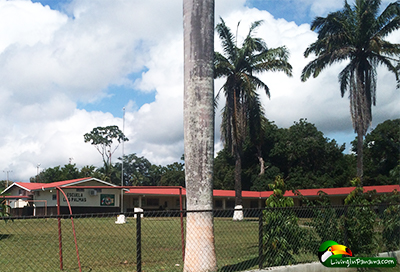
Oh fun fact before I go, the original Las Palmas school building was burnt to the ground, maybe in hopes of erasing it from the school system. But is was rebuilt, and sadly still features ever the decreasing teaching and learning standards taught there.
This is, of course, only a brief summery of the most popular schools here in Puerto.
I have provided a list of all schools in Puerto Armuelles at the end of the article, as well as
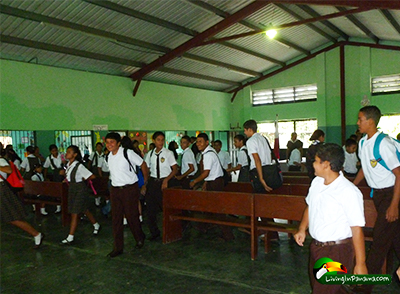
their geographical locations.
If you can't find one of the schools on the map you may have to ask around town.
If you would like more information about a particular school ask me in the comments.
Thanks for reading.
Skylar.
This article was written by my 14 year old daughter, Skylar Vayda. Over the winter, Skylar will be writing a Panama-related articles. She will be picking the topic. We hope you enjoy them.
P.S. School starts here in just a few days -Monday, Feb. 29, 2016.
[leadplayer_vid id="56CDB580216A9"]

On Monday, February 22, the Panama band, Afrodisiaco, is competing in a 2016 International Song Festival. They will be performing their song, Coming from Panama (Viene de Panamá )
Led by Miroslava Herrera and Tatiana Rios, they will compete in the folklore category, along with
Comes From Panama was selected from more than 500 songs to participate in the competition folkloric Viña del Mar International Song Festival 2016.
Comes From Panama is a new song with the atravesao drum beat from the Azuero region of Panama. The drum has its origin in Africa. It was brought to Panama during the 16th century when there was slave trade from Angola, Cameroon, Guinea, Congo and other territories. European influences that are rooted in the region such as the violin, mejoranera (inspired guitar) are incorporated.
The band members say they chose Aphrodisiac as their name because it evokes the desire for freedom of the black slave in America, says Herrera.
Among long-term goals, the group to record songs representative of the origins of black drum provinces of Colon, Darien and the Azuero region.
I very much enjoyed their song. I hope they do well in the competition.
Viva Panama!
Sources:
PanamaNewsroom.com
Youtube video description of video above